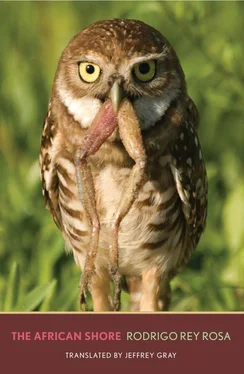The man who fed it meat was talking with someone — the sound of their voices came through very faintly, drowned in the snore of an automobile engine. The stranger raised his voice, and the sound of the car moved off. The little dog was barking. Someone drew near on the stone path that descended from the upper garden.
The owl recognized the sound of the footsteps of the person approaching: it was the boy who had wakened it from its light sleep earlier in the afternoon by tapping his finger on the window pane. “Yuk, yuk,” was the sound the boy had made, which startled it. It had once heard another boy make the same sound.
That was when the owl lived in the ruins of the old Italian hospital. The cornice where it had made its nest looked over an unkempt garden, with rows of flowers grown into thickets, and creepers hanging from the branches. It had felt safe there, since no one, neither nuns nor monks, had walked in that garden for many years. From the other side of the garden, next to the railing that separated it from the street, there used to be a large kennel where a police dog was kept and where one day a Moroccan boy moved in. He was from the country and had the rustic ways of country people. He must have seen the owl return to its nest one morning, because later he climbed up to the cornice with a ladder to surprise it while it was sleeping. He threw a gunny sack over it and tied its feet with a rope. The owl, quivering at the memory, let out a screech. It was awake now, but it was helpless.
“Yoohoo, up here!” came the voice of Mme. Choiseul from a balcony. “How did it go?”
“Comme ci, comme ça,” he said, looking upward. “Hasn’t Julie come back?”
“Yes, she came back. But she’s gone shopping, something last-minute. We invited some friends to dinner. A Belgian girl married to a Moroccan. If you’d like to join us, you’re most welcome.”
“Yes, delighted. Thanks.”
“They’ll be coming at seven.”
“Can I help you with something?”
“No, no. Everything’s set.”
“You’re sure?”
“Well, if you insist — how would you like to cut some flowers from the garden?”
The night smelled of the jasmine he had cut. He pushed open the door of the guest house and, seeing the window open and the cage empty, felt a sensation of loss which — he told himself — had nothing to do with a mere owl. He looked under the bed, and a current of cold air grazed his head. He went to shut the window, which he was sure he had not left open. He noted the firewood in the basket and thought of Artifo: maybe he could explain it. He looked through the window at the darkness outside, accented by the distant glow of lights on the hilltops on the far side of the Bay of Tangier, which for a moment he had confused with stars.
He left the house and walked around it, looking for some sign of the bird. If it had leapt out the window, it might still be nearby. He walked toward the main house, and, halfway up, stopped to listen: Mme. Choiseul and Julie were discussing something in one of the upstairs rooms, but he couldn’t make out what they were saying. He walked around the house and ran into Artifo near the room where the wood was stored.
“Excuse me, Artifo. Have you been in my room?”
“Not yet, sir.”
“Who brought the wood, do you know?”
“I don’t know. Maybe it was Fátima. Have you run out? I’ll bring some more.”
“No, thank you. It’s not that. Someone opened the window — it wasn’t you?”
“No, sir.”
“Who might have opened it?”
Artifo shrugged his shoulders, as if to ask why anyone would be worried about an open window.
“The owl has escaped,” he said. “Have you seen it?”
“No. Wasn’t it in its cage?”
“I left it out of its cage.”
“Ah. Why did you leave it out?”
“Because. . Forget it.” He turned around, holding his anger.
“Don’t forget we’re in Morocco,” said Mrs. Sebti, setting the salad platter within reach of her hostess. “Didn’t you know the law here forbids and punishes relations between men and women if they’re not married?”
“Only between men and women, eh?” said Mme. Choiseul, looking at Adil es-Sebti, the Moroccan husband.
Meanwhile Adil was telling Julie:
“Of course, but just like the sardine paste, the olive oil came from here. In Cádiz it was poured into amphorae made there and was shipped that way to Rome. The maquila was invented a long time ago, my dear friend. .”
From the ocean the sound of a motorboat rose up. They all heard it.
“Smugglers,” said Adil.
They sat awhile listening — the sound moved away from the coast — then returned to their conversations.
“You’re Muslim, aren’t you?” said Julie to Mrs. Sebti.
“It’s automatic, if you marry a Moroccan.”
“But it’s a bit absurd,” said Mme. Choiseul. “They don’t believe in anyone converting, unless for some reason it’s convenient for them. As in this case: in order to appropriate the enemy’s wife.” She smiled. “Clan mentality. Pardon me, Adil, but that’s how I see it.”
“What are the Colombian women like?” asked Mrs. Sebti, to include him in the conversation.
He was thinking of the owl.
“Excuse me?”
“Are the Colombian women terribly Catholic,” she smiled ambiguously, “or are they emancipated?”
“There are all kinds,” he answered.
“Like here.”
“Maybe. Maybe here they’re more traditional.”
“Are they like the Spanish?”
“And what is that supposed to mean?” Mme. Choiseul interrupted.
“So open,” smiled Adil.
“I couldn’t tell you,” he said. “I don’t know Spanish women very well.” He turned to Julie and said, “The owl is gone. The window was open, but I was sure I shut it.”
Mme. Choiseul was saying to Adil:
“I agree, perhaps they aren’t any happier. Still, it seems to me that it’s worth trying.” Then she turned toward him to say, “The owl? Really?” She thought a moment. “You’re not missing anything else? Money, jewelry?”
“No. Nothing.”
“Artifo’s grandson. .” Mme. Choiseul decided not to continue; the others were still talking about the emancipation of the Moroccan people. Then: “I saw him prowling around your room. Let’s ask Artifo about it later.”
“No, no,” Adil was saying. “They should put all undocumented blacks in jail. They’re a real problem.”
Julie was furious.
“You may know about sardines and olive oil,” she said, “but your opinions on other matters won’t get you very far in Europe or anywhere else in the civilized world.”
“I don’t plan to change countries,” said Adil, smiling a bit bitterly, “nor religions, so what you’re saying is not a problem for me.”
Mrs. Sebti looked at her husband with disapproval.
“I think I want to go get some sleep. Shall we go?” she said to him.
Mme. Choiseul walked them to the door, while Julie, who seemed nervous, cleared off some glasses and took them into the kitchen. She returned with several bottles of beer on a tray.
“Have one?” she asked, and he stretched out his hand to take a bottle. “Christine’s asking Artifo about Hamsa, his grandson. It seems he’s the one who took the owl.”
Mme. Choiseul returned, her face showing satisfaction. She sat down near the fire and poured herself half a glass of beer.
“I think the mystery is solved,” she said.
They went on foot, following Artifo on the road between the high walls of the Saudi palaces, spiked with sharpened metal points and broken bottle shards, while the wind hummed along the electrical wires. The last wall ended abruptly in an avalanche of garbage that fell down the hillside toward the sea among a thin grove of cedars. They could hear the sea, aniline blue, crashing on the shore. Two crows and, farther down, two poor women wearing black kerchiefs and turquoise and tangerine-colored djellabas rummaged purposefully through the dump.
Читать дальше












